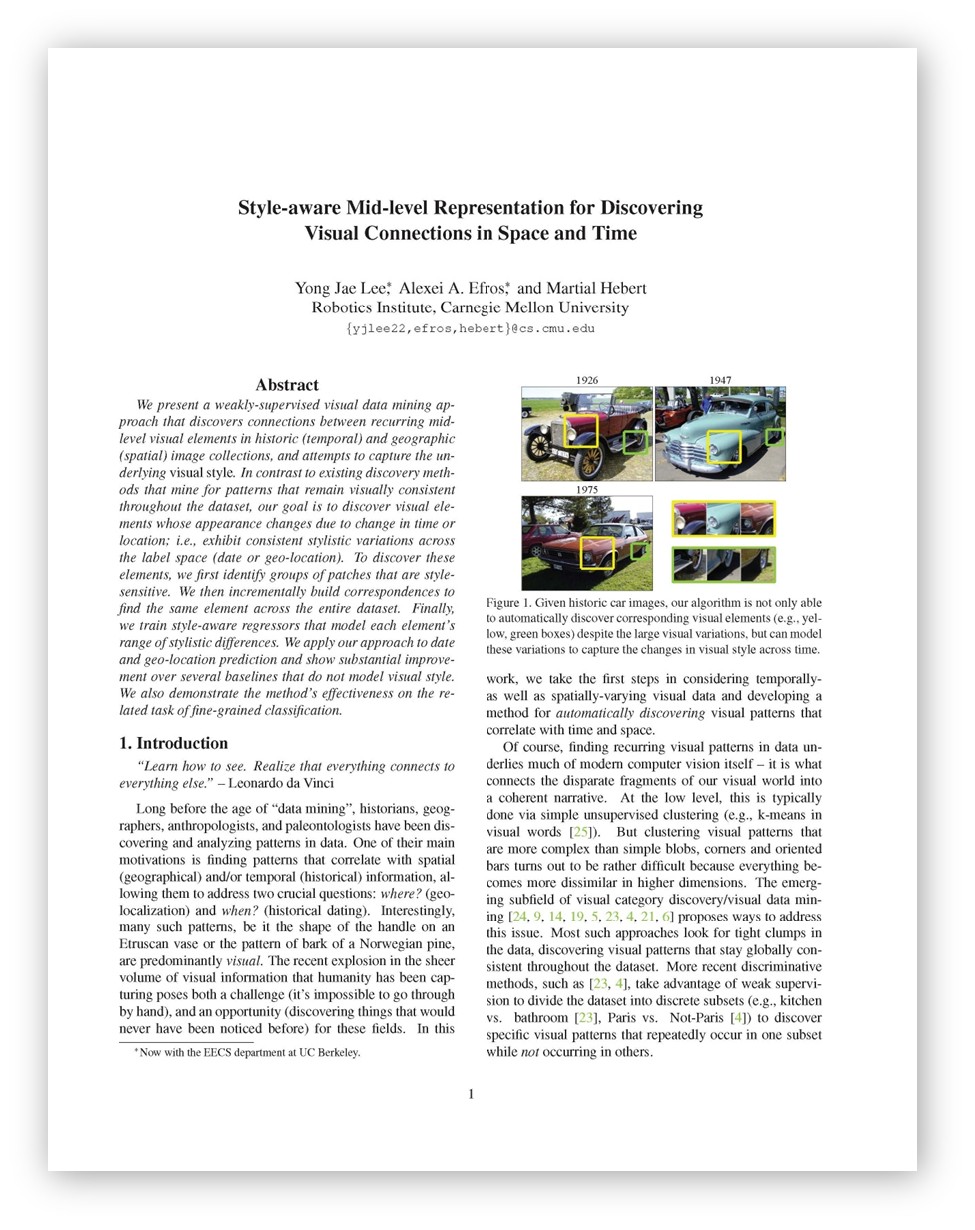Style-aware
Mid-level Representation for Discovering
Visual Connections in Space and Time

Visual Connections in Space and Time

People
Yong Jae Lee
Alexei A. Efros
Martial Hebert
Abstract
Paper & Presentation
Code
Code can be downloaded here.
Data
Our historical car dataset (CarDb as referenced in the paper) can be downloaded here.
The database contains historical car images from 1920s to 1990s crawled from cardatabase.net. There are 10130 training and 3343 test images. Note that the entire dataset is 2.8 GB.
Annotations include: model, manufacturer, year, and the date, city, and country that the photo was taken. These can be accessed in matlab by:
>> imgInfo = imfinfo(imgfile); % imgfile is the file name of the image; e.g., '1.jpg'
>> annotations = imgInfo.Comment; % get annotations
>> year = str2double(annotations{3}(6:end)); % get
the model year of the car
Acknowledgements
Yong Jae Lee
Alexei A. Efros
Martial Hebert
Abstract
We
present a weakly-supervised visual data mining
approach that discovers connections between
recurring midlevel visual elements in historic
(temporal) and geographic (spatial) image
collections, and attempts to capture the underlying
visual style. In contrast to existing
discovery methods that mine for patterns that remain
visually consistent throughout the dataset, our goal
is to discover visual elements whose appearance
changes due to change in time or location; i.e.,
exhibit consistent stylistic variations across the
label space (date or geo-location). To
discover these elements, we first identify groups of
patches that are stylesensitive. We then
incrementally build correspondences to find the same
element across the entire dataset. Finally, we
train style-aware regressors that model each
element’s range of stylistic differences. We
apply our approach to date and geo-location
prediction and show substantial improvement over
several baselines that do not model visual
style. We also demonstrate the method’s
effectiveness on the related task of fine-grained
classification.
Paper & Presentation
 |
ICCV Paper (pdf) Supplemental material (pdf) Talk slides (pptx) Video Presentation Citation Y. J. Lee, A. A. Efros, and M. Hebert. Style-aware Mid-level Representation for Discovering Visual Connections in Space and Time. Proceedings of the IEEE International Conference on Computer Vision (ICCV), 2013. |
Code
Code can be downloaded here.
Data
Our historical car dataset (CarDb as referenced in the paper) can be downloaded here.
The database contains historical car images from 1920s to 1990s crawled from cardatabase.net. There are 10130 training and 3343 test images. Note that the entire dataset is 2.8 GB.
Annotations include: model, manufacturer, year, and the date, city, and country that the photo was taken. These can be accessed in matlab by:
>> imgInfo = imfinfo(imgfile); % imgfile is the file name of the image; e.g., '1.jpg'
>> annotations = imgInfo.Comment; % get annotations
>> year = str2double(annotations{3}(6:en
Acknowledgements
This
work was supported in part by Google, ONR MURI
N000141010934, and the Intelligence Advanced
Research Projects Activity (IARPA) via Air Force
Research Laboratory. The U.S. Government is
authorized to reproduce and distribute reprints for
governmental purposes notwithstanding any copyright
annotation thereon. Disclaimer: The views and
conclusions contained herein are those of the
authors and should
not be interpreted as necessarily representing the
official policies or endorsements, either expressed
or implied, of IARPA, AFRL or the U.S. Government.